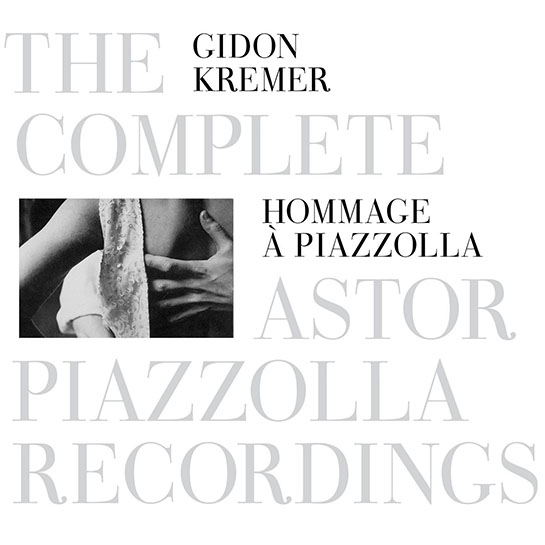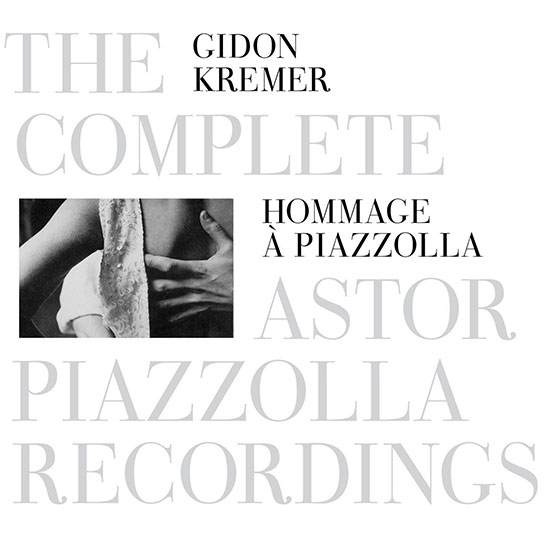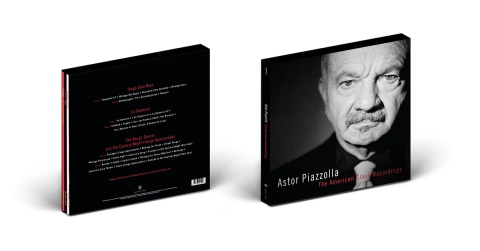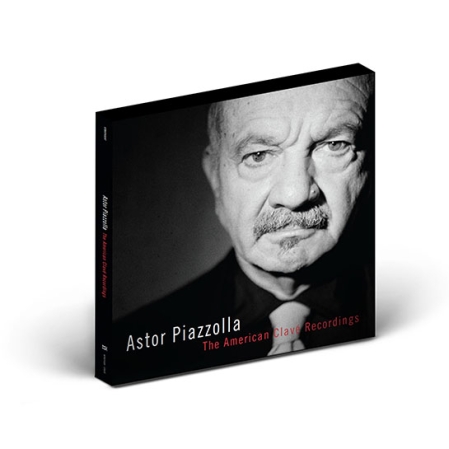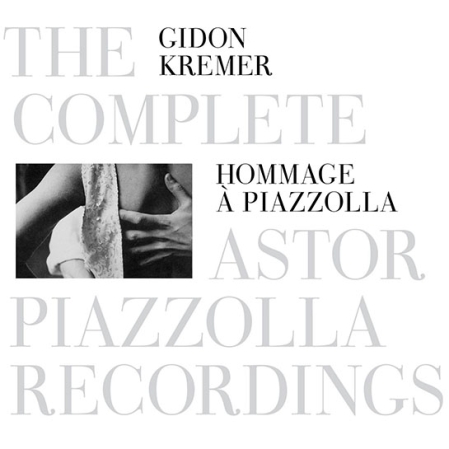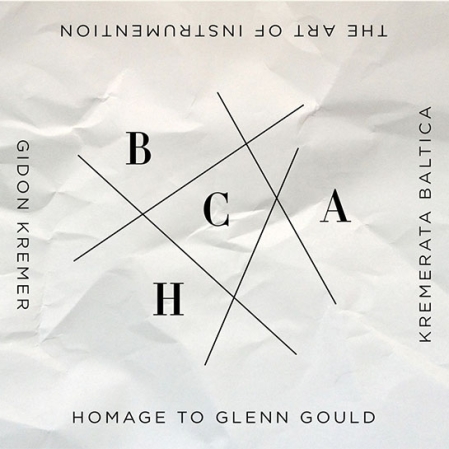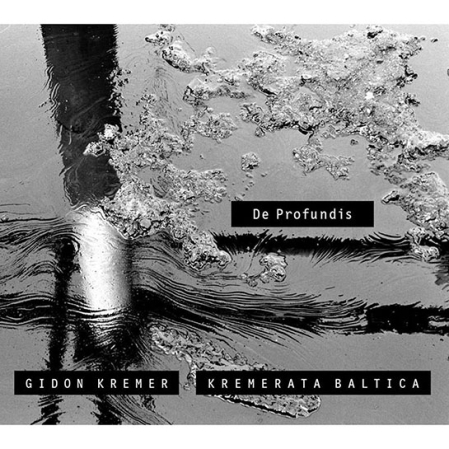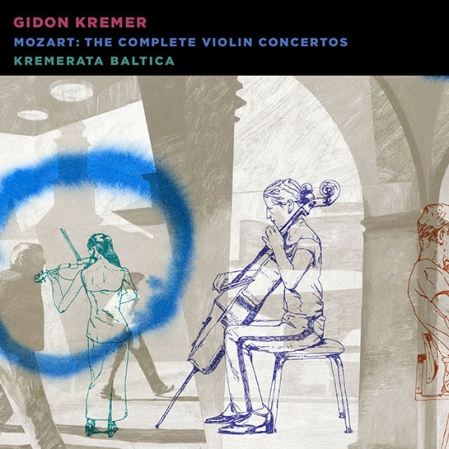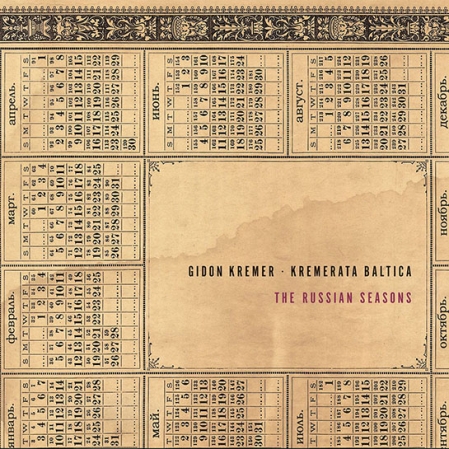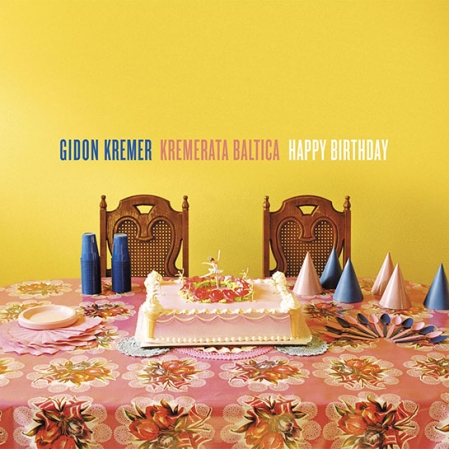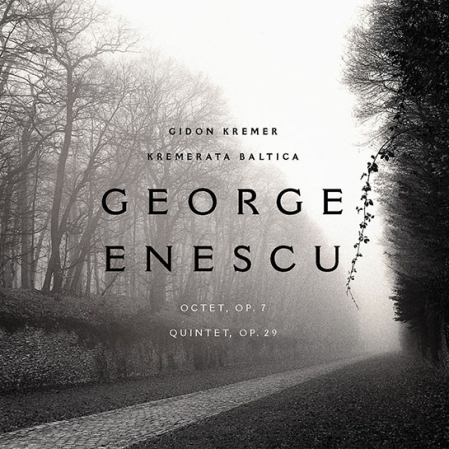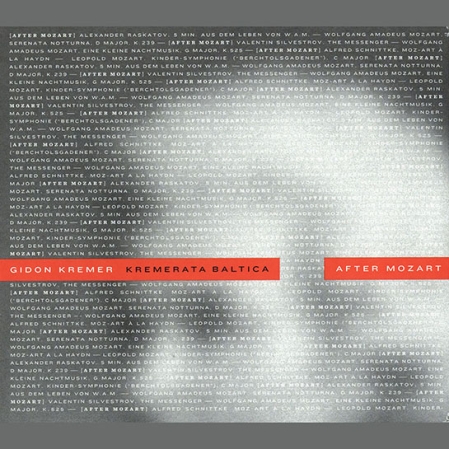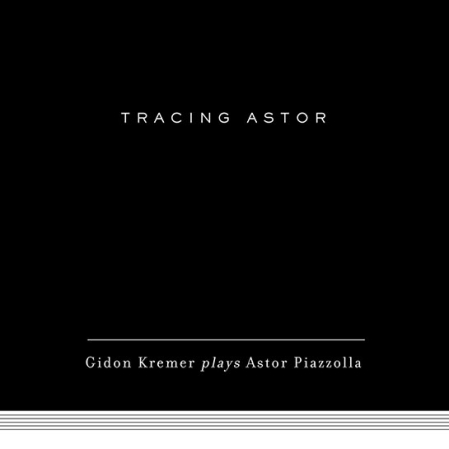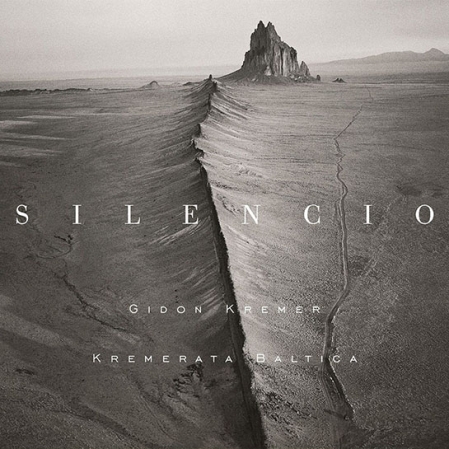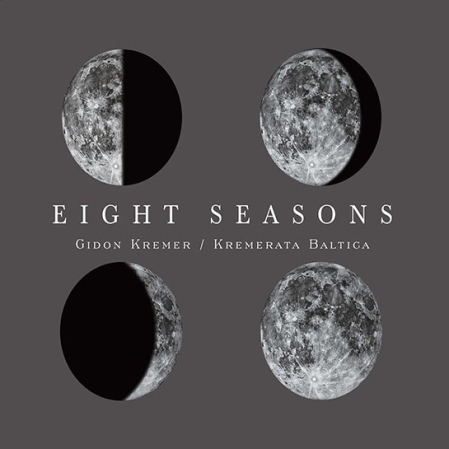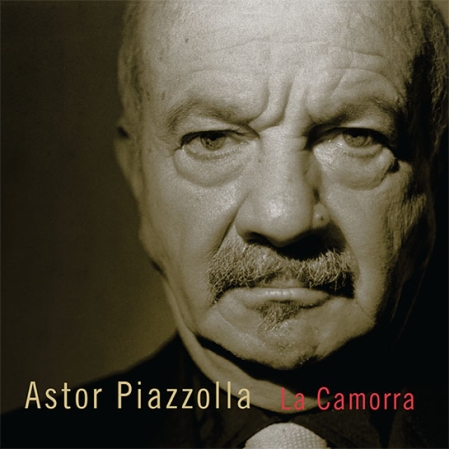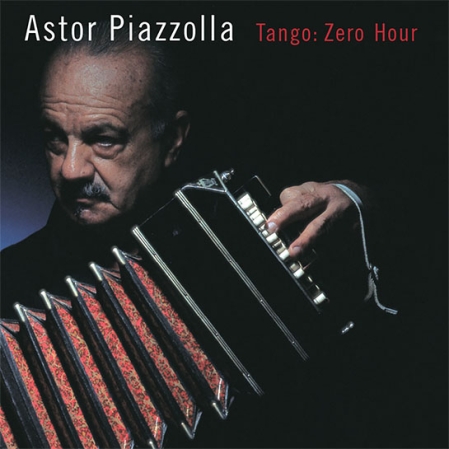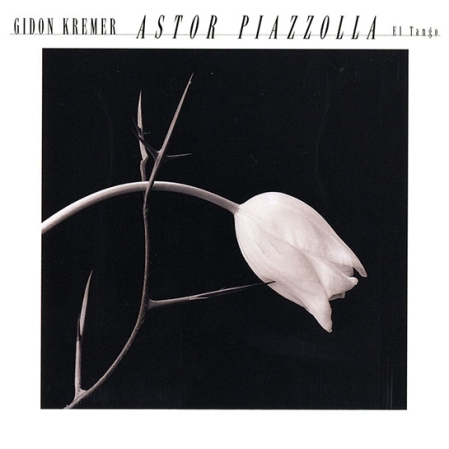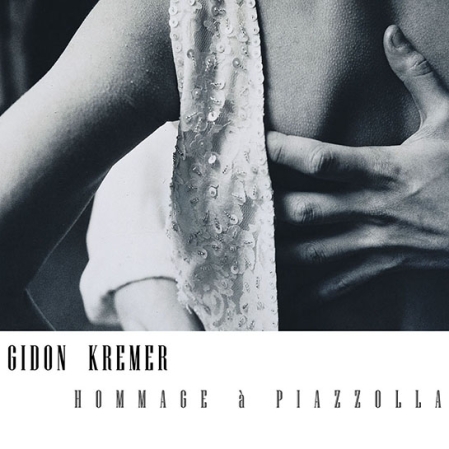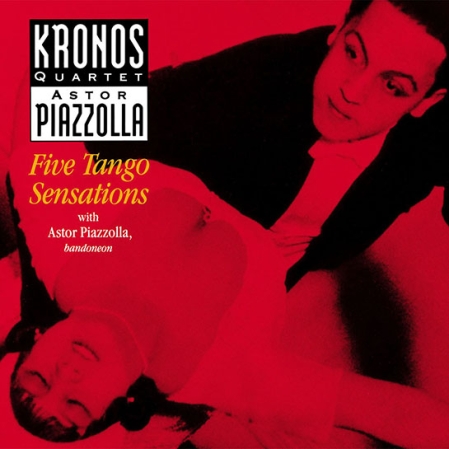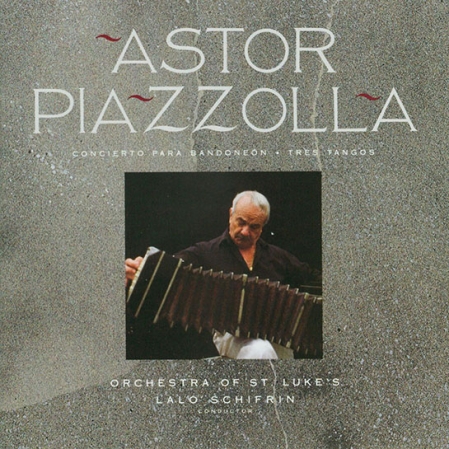This eight-CD box set brings violinist Gidon Kremer’s six previously released recordings of Argentine composer Astor Piazzolla’s music together for the first time, along with a seventh album featuring a previously unreleased live recording from the CBC's Glenn Gould Studio. The Boston Globe has praised "both Piazzolla’s and Kremer’s ability to transcend genres and communicate a depth of emotion in which the best of classical, jazz and world music come together smoothly.”
Nonesuch Records releases violinist Gidon Kremer’s Hommage à Piazzolla: The Complete Astor Piazzolla Recordings on November 19 December 4, 2012. The eight-disc box set brings Kremer’s six previously released recordings of the Argentine composer’s music together for the first time, including four Nonesuch releases—Hommage à Piazzolla (1996), El Tango (1997), Eight Seasons (2000), and Tracing Astor (2001)—and two that were released by Teldec—the opera María de Buenos Aires (1998, two CDs) and Tango Ballet (1999). The set’s seventh album, which is being released for the first time, features a 14-song live recording from the CBC’s Glenn Gould Studio from 1997; composer and fellow Argentine Osvaldo Golijov has written liner notes for this new disc.
Composer, arranger, and bandoneón virtuoso Astor Piazzolla (1921–1992) was inspired by American jazz and concert music to revolutionize the Argentine tango in the years after World War II. “For me,” he once said, “tango was always for the ear rather than the feet.” His “nuevo tango,” with its intense melancholy and harmonic and rhythmic innovations, enraged traditionalists but became influential among musicians and fans around the globe.
Upon their release, the classical violinist Kremer’s recordings of Piazzolla’s work (which was thought of as “popular” music) were critically acclaimed, with Hommage à Piazzolla achieving pop sales levels in many countries, and concerts by Kremer and his tango ensemble selling out around the world. USA Today said, “Latin melancholy meets [Latvian] violinist Gidon Kremer’s restless, nervous temperament and wiry tone, giving the music an extra psychological tension, as well as some eccentric flights of improvisation. Wonderfully haunting,” and the Philadelphia Inquirer said, “Kremer … has a temperament as sweetly adventurous as a child’s and at times as doleful. Doleful is the word for much of this accomplished if whimsically arranged music. Doleful, earnest and fascinatingly performed.” Guest musicians in these recordings include Caetano Veloso, Milva, Horacio Ferrer, Julia Zenko, Jairo, the Astor Quartet, and Kremerata Baltica.
Kremer says of Piazzolla, whose work he has championed for nearly two decades: “You can sense through his music an experience that makes you at the same time joyful and sad. And saying these two words, ‘joyful’ and ‘sad,’ I could say as well that the striking combination of two extreme emotions go together like they go in Franz Schubert’s music, in Astor’s music. I know very few composers where you can feel it in such a passionate way.”
Composer John Adams, in his liner notes for Kremer’s first record of the Argentine’s work, said that Piazzolla’s “harmonic sequences have a sense of inevitability in the way they pull inexorably toward the cadence, and it is the core of Piazzolla’s art to arrange—or try to postpone—these arrivals in the most wrenchingly bittersweet of ways. It is as much as saying that you have finally arrived home, but home is no longer the same. Your house has been razed, and strangers now live in the neighborhood where you once played as a child.”
PRODUCTION CREDITS
Disc One—Music by Astor Piazzolla, except track 10 by Jerzy Peterburshsky. Produced and engineered by Peter Laenger, Tritonus Musikproduktion, Stuttgart. Recorded July 1995 at Castle, Lockenhaus, and January 1996 at Studio Guillaume Tell, Paris. Assistant Engineer: Marcus Heiland. Design by Barbara deWilde. Cover photograph by Isabel Muñoz. Executive Producer: Robert Hurwitz
Disc Two—Produced and Engineered by Peter Laenger, Tritonus Musikproduktion, Stuttgart. Recorded December 1996 at Studio Guilaume Tell, Paris. Assistant Engineer: Stephane Briand. Additional Recording Produced by Jaques Morelenbaum. Recorded May 1997 at Studio Discover, Rio de Janeiro. Design by Barbara deWilde. Cover photograph: Tulip, 1985 by Robert Mapplethorpe. Executive Producer: Robert Hurwitz
Discs Three & Four—Music by Astor Piazzolla. Libretto by Horacio Ferrer. Arranged by Leonid Desyatnikov. The Tango operita María de Buenos Aires is under the patronage of the Argentinian Ministry of Culture. Produced by Helmut Mühle. Recorded Fall 1997 in Wels, Austria, and Spring 1998 in Buenos Aires. Engineered by Tobias Lehmann. Assistant Engineer: Joachim Goβmann (Wels), Sebastian Losicer (Buenos Aires). Digital Editing: Gudrun Maurer. Production Assistant: Martina Gottschau. Cover Design by Barbara deWilde. Package Design by Jason Arias. Cover Photograph © Alain Daussin. Executive Producer: Wolfgang Mohr
Disc Five—Transcription: Leonid Desyatnikov. Produced by Friedemann Engelbrecht. Recorded February and April 1998 at Casino Zögernitz, Vienna. Engineers: Eberhard Sengpiel (1–6, 7–10); Tobias Lehmann (11–13). Assistant Engineers: Philipp Nedel, Josef Rozsnyai (1–6, 7–10); Peter Weinsheimer, Josef Rozsnyai (11–13). Digital Editing: Jens Schünemann. Cover Design by Barbara deWilde. Package Design by Jason Arias. Cover Photograph © Lili Gelman / Millenium Images. Photograph of Astor Piazzolla’s bandoneón by Joel Meyerowitz. Executive Producer: Wolfgang Mohr
Disc Six—Music by Antonio Vivaldi (1-3, 5–7, 9–11, 13–15), Astor Piazzolla (4, 8, 12, 16). Recording produced by Helmut Mühle. Recorded September 6-9, 1998, Reutlingen-Gönningen, Germany, at Evangelische Peter und Paul-Kirche. Recording Engineer: Markus Heiland, Tritonus Musikproduktion GmbH. Editing: Gudrun Maurer. Design by John Gall. Executive Producers: Gidon Kremer and Matteo Tradardi
Disc Seven—Music by Astor Piazzolla (1–9, 11), Giovanni Sollima (10), Leonid Desyatnikov (12), Georgs Pelecis (13). Arranged by Leonid Desyatnikov (1, 6, 11), Gidon Kremer (2–4, 7–9, 11). Text for track 5 by Horacio Ferrer. Produced by Helmut Mühle and Gidon Kremer. Recorded September 1999 at NLG Studio, Berlin. Engineer: Philipp Nedel. Edited by Gudrun Maurer. Tracks 2–4 Produced and engineered by Peter Laenger, Tritonus Musikproduktion, Stuttgart; Recorded December 1996 at Studio Guillaume Tell, Paris; Assistant Engineer: Stephane Briand. Track 10 Recorded September 2000 at Feldkirch Conservatory Chapel, Feldkirch, Austria; Assistant Engineer: René Möller. Track 13 Recorded February 2001 at NLG Studio, Berlin; Assistant Engineer: Niels Müller. Design by John Gall. Cover image: Large Shadow, Sixth Avenue, New York, 1986, courtesy the Bruce Cratsley Archive, Sarah Morthland Gallery, New York. Executive Producer: Robert Hurwitz
Disc Eight—Produced by Barbara MacKenzie-Mahler. Recorded October 7, 1997, at Glenn Gould Studio, Toronto, for broadcast on CBC Radio. Recording Engineer: Doug Doctor. Edited by Tom Lazarus. Mastered by Robert C. Ludwig at Gateway Mastering Studios, Portland, ME. Cover Design by Barbara deWilde. Package Design by Jason Arias. Photography by Alexandra Kremer-Khomassouridze
515783
MUSICIANS
Disc One—Gidon Kremer, violin (1-11); Vadim Sakharov, piano (1, 3, 6-11); Alois Posch, double bass (1-3, 6-10); Michel Portal, clarinet (2, 9); Per Arne Glorvigen, bandoneón (2, 3, 5-10); Friedrich Lips, bajan (4); Svjatoslav Lips, piano (4); Vladimir Tonkha, violoncello (4); Mark Pekarsky, percussion (4); Paul Meyer, clarinet (6); Elisabeth Chojnacka, harpsichord (8)
Disc Two—The Astor Quartet: Gidon Kremer, violin; Per Arne Glorvigen, bandoneón; Vadim Sakharov, piano; Alois Posch, double bass. Guest artists: Odair Assad, guitar (1, 10); Sérgio Assad, guitar (1, 10); Milva, vocals (3, 9); Caetano Veloso, narrator (5)
Discs Three & Four—Horacio Ferrer: El Duende. Julia Zenko: María, La Sombra de María. Jairo: La Voz de un Payador, Porteño Gorrión con Sueño, Ladrón Antiguo Mayor, Analista Primero, Una Voz de Ese Domingo. Gidon Kremer, violin; Per Arne Glorvigen, bandoneon; Vadim Sakharov, piano; Alois Posch, double bass; Maria Fedotova, flute; Ula Zebriunaite, viola; Marta Sudraba, violoncello; Peter Sadlo, percussion. Coral Lírico Buenos Aires, chorus: Celeste Berruti, Myriam Casanova, Marta Culleres, Patricia Gutierrez, Marcela Pichot, Kathryn Power, Araceli Quijano, Jorge Balagna, Juan Barrile, Carlos Bengolea, Rodolfo Cano, Carlos Flores, Ricardo Ochoa, Carlos Sampedro; Ricardo Ochoa, chorus master
Disc Five—Gidon Kremer, violin (1–10); Kremerata Baltica (1–13); Per Arne Glorvigen, bandoneón (7–10); Alois Posch, double bass (7–10); Vadim Sakharov, piano (7–13); Rolf Gupta, conductor (7–10)
Disc Six—Gidon Kremer, artistic leader, solo violin; Kremerata Baltica
Disc Seven—Gidon Kremer, violin (2-9, 11-13); Ula Ulijona, viola (1, 5, 6, 11, 12); Marta Sudraba, cello (1, 5, 6, 10-12); Sol Gabetta, cello (10); Leonid Desyatnikov, piano (12); Horacio Ferrer, voice (5); Kremerata Baltica (10, 13)
Disc Eight—The Astor Quartet: Gidon Kremer, violin; Per Arne Glorvigen, bandoneón; Vadim Sakharov, piano; Alois Posch, double bass
